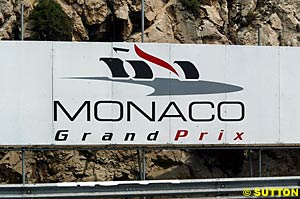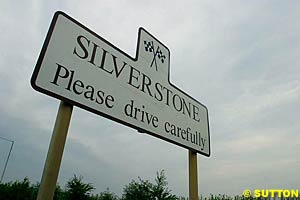Atlas F1 Magazine Writer
Fresh from the Formula One paddock
Possibly the Weekly Grapevine's suggestion in early October that the BRDC should consider running a non-championship British Formula One race on the basis that "Grand Prix" is in the public domain opened a can of words, or possibly it was natural corrosion which permitted the crawlies to work their way through numerous rusty holes. Whatever, last week's news that Formula One Licensing - one of Bernie Ecclestone's company - has applied to register 'Grand Prix' as its trademark came as no great shock.
Whether or not FOL will succeed on a blanket basis is one for an international army of lawyers, for the term – meaning Grand Prize - has over the ages described superior events in categories ranging from athletics and equestrian contests through literature and tennis to wine and whisky blending, with sundry two-, three-, four-and six-wheeled motor races mixed in. And, not even all races termed such ran to Formula One regulations (in fact, the majority distinctly did not), and even fewer held World Championship status. So, all categorical and numeric odds are, it seems, stacked against Formula One's various battle-weary advisers.
Or, what term would his company apply for in Germany? German Grand Prix, Grosser Preis von Deutschland? And, elsewhere, where Gran Premio, Grande Premio or Nagydij describe their countries' greatest four-wheeled motor racing prizes. And, after all, who should decree whether Formula One events should take precedence over MotoGP in the registration stakes, even if world-wide television audiences favour the former? The FIM's world championship, though, began a couple of years before the FIA got its act together, and, in many, mostly Mediterranean, countries, MotoGP attendances outnumber four-wheeled ticket sales by a factor of three to one.
These thoughts, somewhat myopically, overlook the formation and reach of the European Union Office for Harmonization in the Internal Market (Trade Marks and Designs), which, having adopted the necessary protocols on October 1st this year, rather conveniently processes international trade mark registrations within the EU – where, at present at least, 60% of Formula One Grands Prix are contested. And, as can be seen below, Ecclestone is right at the head of the queue.
Then remains, though, the prickly question of countries such as South Africa, The Netherlands, Qatar and Macau and others – which presently host, and have done for some time, motorsport Grands Prix, but not of the Formula One variety. Could/should Ecclestone be permitted to register "Grand Prix" tags over events outside his commercial jurisdiction, even if he could argue that he may enter/return to those countries at some stage in future? International commercial law does provide precedents, but the organisers of affected events could well argue that they acquired distinctive rights through use – and there are precedents for that, too.
Moreover, consideration should be given to events in Canada, the US and elsewhere, where, yes, F1 Grands Prix are hosted, but so too are races for cars not competing under Ecclestone's flag. Surely the Miami Grand Prix (for sports cars), or the Long Beach Grand Prix for OWRS cars have every right to the name in the regions?
And, where does all this leave Ecclestone's sworn enemy, the GPWC? The acronym comes, of course, from Grand Prix World Championship, and, as such, this co-operative of motor manufacturers has more than a vested interest in the registration of the terms. Crucially, they applied to register the four-worded title in November 2001, but withdrew the application 18 months for unexplained reasons. Instead, they registered the acronym GPWC as their trademark.
All of which makes the registration applications by Ecclestone within the EU for the term "Grand Prix" rather more interesting and far-reaching, for they have been ongoing, and are not, as recently reported, new developments. Their history is as follows (with the EU's official explanation of each step listed immediately thereafter):
APPLICATION RECEIVED - September 1st 2000
FILING DATE GRANTED - September 16th 2000
These conditions are:
CLASSIFICATION CHECK - October 5th 2000
FORMALITIES CHECK - December 12th 2000
ABSOLUTE CHECK - December 13th 2000
APPLICATION ACCEPTED - November 22nd2004
Seemingly, as far as the EU is concerned, registration of "Grand Prix" in favour of Formula One Licensing is all over bar the shouting, and, whether some donkey trainer in the Ligurian Alps or a traditional winemaker in the Loire likes it or not, Ecclestone will soon control "Grand Prix" in addition to "Formula One". But not so fast.
The procedure for registering a trademark requires, once the application has been accepted, for a publication of the application in the European Union's official bulletin. This will call on anyone who finds reason why not to grant the applicant his requested trademark to file an opposition within a certain time frame. Ecclestone knows well about this step - his lawyers have been filing oppositions, quite often successfully, to every trademark application relating to Formula One. For example, one known website dumped its original name after Ecclestone's lawyers opposed it in the trademark registration process. Instead, the said website chose to replace 'Formula One' with 'Grand Prix' in its name. Could it soon be forced to change its name again?...
Not so clear cut, regardless of decisions taken over the next day or two, is ownership of "British Grand Prix". On the last working day before Christmas three years ago, the Royal Automobile Club Motor Sports Association Limited applied for registration of the term, with details of the submission captured by the UK's Patent Office on January 3rd 2002. Matters lay dormant until mid-March this year, when it amended its requested categories. It retained "regulation and organising motor land racing events", but deleted "sponsorship services", "advertising and business services relating to motor land racing events', and the "publication and distribution of related materials".
Two weeks later, though, it was back with a further amendment, namely a filing asserting its entitlement to "British Grand Prix" on the basis of "distinctiveness through use" – and, plainly, the forerunners of the RAC MSA did organise the very first Formula One Grand Prix and did term it "British Grand Prix" way back in 1950, or well before Ecclestone's involvement with the event – and, on the same day, published an advertisement for Opposition purposes.
In summary, it appears Formula One Licensing will receive Europe-wide trade mark rights over "Grand Prix" in relation to four-wheeled motorsport events held in the territory, but will be forced to battle it out with the RAC MSA over the term "British Grand Prix". Ecclestone may, of course, have one advantage: his lawyers are normally bigger than those mustered by others. But, equally, as proven by a judgement this week past, he does not win every battle outside of his fiefdom.
Interestingly, the British GP's would-be promoter, the BRDC, is out in the cold on this one, but the resultant chill raises a good question: should it apply for a grand prix, what then? Applications are submitted by the appropriate FIA-affiliated sporting associations (ASNs), with Ecclestone negotiating with individual promoters, who hold hosting concessions granted by their ASN, to agree terms.
It is, in fact, a complex, dual-steam process: satisfactory agreement needs be reached between the commercial rights holder (FOH) and the ASN-approved promoter for an event at a circuit approved by the FIA, with a separate event application submitted by the ASN, which carries full national responsibility – in this case RAC MSA Ltd – to the FIA.
Should RAC MSA Ltd lose its trademark case, will it simply refuse to apply to the FIA for future dates, thus getting its own back?

 Plus, would, for example, the Parisian trademark registry permit an Englishman – regardless of disingenuous protestations, court judgements, shareholding structure and registered domiciles - to hijack France's earliest linguistic contribution to international motorsport.
Plus, would, for example, the Parisian trademark registry permit an Englishman – regardless of disingenuous protestations, court judgements, shareholding structure and registered domiciles - to hijack France's earliest linguistic contribution to international motorsport.
Application for Community Trade Mark (CTM) has been filed within the Office
After having checked that all the conditions of Rule 9 of the Implementing Regulation and Article 26 of the Community Trade Mark Regulation are met, the date of the reception at the Office or a National Office is granted as the filing date.
Examination of the classification proposed by the applicant: In this process there may be exchanges between the examiner and the applicant or his/her representative because of a disagreement in the classification procedure. If after the examination of the classification by the examiner, new classes result, the applicant could have to pay a supplementary fee.
During this stage the examiner of formalities checks that all other formalities are in the file and this also includes the appointment of a representative when it is compulsory. Article 88 of the Regulation requires the appointment of a representative when the applicant has no domicile, no principal place of business or a real and effective industrial or commercial establishment in the European Union.
Examination of absolute grounds. In this process there may be exchanges between the examiner and the applicant or his/her representative because of a disagreement in the interpretation of the legislation. The application might be totally or partially rejected after this examination.
The CTM application has been examined under Absolute Grounds and has not encountered any problem; it is therefore ready for publication in the bulletin.

 Not surprisingly, opposition came thick and fairly fast, and guess from which quarter? On April 23rd Formula One Licensing registered opposition, and applied for registration of its own over the disputed term, listing all categories the RAC MSA had originally applied for, plus additions. So, where the British motorsport body had previously trimmed its categories, Ecclestone went for their original lot, and then more. The Patents Office began examining FOL's application on May 12th, and the matter is still pending.
Not surprisingly, opposition came thick and fairly fast, and guess from which quarter? On April 23rd Formula One Licensing registered opposition, and applied for registration of its own over the disputed term, listing all categories the RAC MSA had originally applied for, plus additions. So, where the British motorsport body had previously trimmed its categories, Ecclestone went for their original lot, and then more. The Patents Office began examining FOL's application on May 12th, and the matter is still pending.
|
Contact the Author Contact the Editor |
Please Contact Us for permission to republish this or any other material from Atlas F1.
|
Volume 10, Issue 49
Interview with Nick Heidfeld
Interview with Williams Technical Chiefs
Bookworm Critique
On the Road
Elsewhere in Racing
The Weekly Grapevine
> Homepage |
